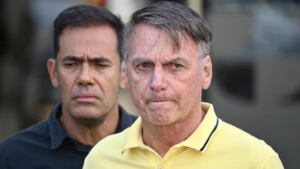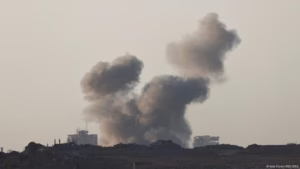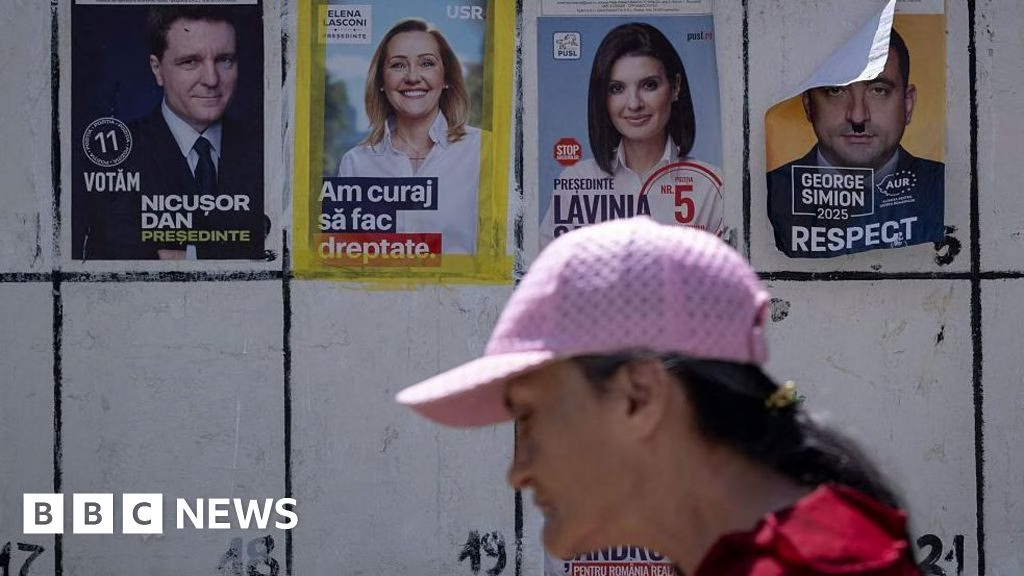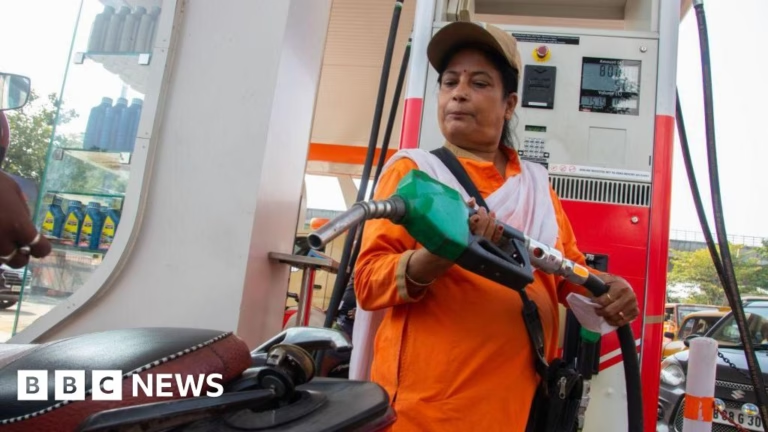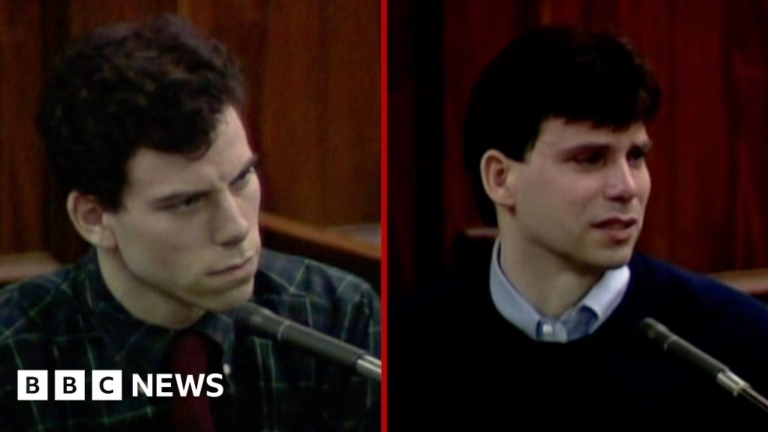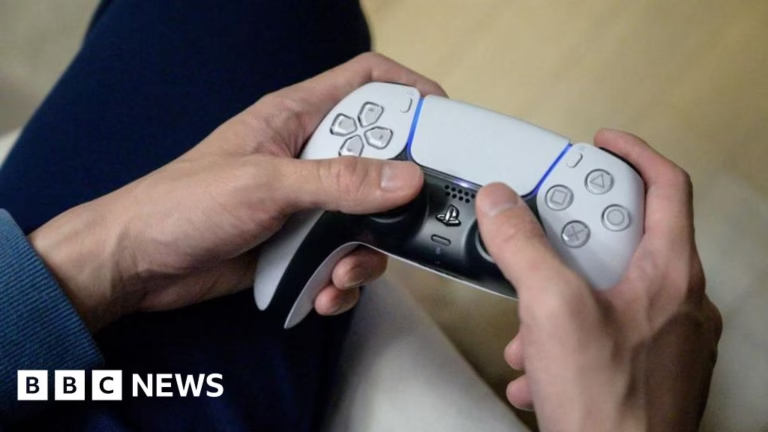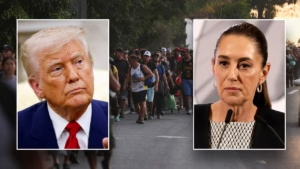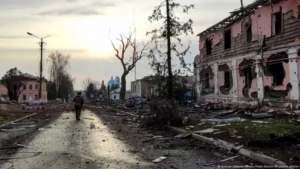Today, Romanians will attempt to elect a new president for the second time, six months after the initial attempt was marred by scandal and confusion.
A radical outsider named Calin Georgescu, who possesses mystical leanings, emerged as the first-place candidate on November 24. However, his victory was nullified due to allegations of campaign fraud and Russian interference.
In February, US Vice President JD Vance strongly criticized Romania for this decision, causing shockwaves within the Romanian political establishment, which heavily relies on its relationship with the US. Nevertheless, Georgescu was prevented from participating in today’s election rerun.
A radical outsider named Calin Georgescu, who possesses mystical leanings, emerged as the first-place candidate on November 24. However, his victory was nullified due to allegations of campaign fraud and Russian interference.
In February, US Vice President JD Vance strongly criticized Romania for this decision, causing shockwaves within the Romanian political establishment, which heavily relies on its relationship with the US. Nevertheless, Georgescu was prevented from participating in today’s election rerun.
This election presents a nationalistic candidate, George Simion, the leader of the Alliance for the Union of Romanians (AUR), in a contest against three centrist candidates: Nicusor Dan, the popular mayor of Bucharest; Crin Antonescu, a liberal representing the governing Social-Democrat and National Liberal coalition; and independent candidate Elena Lasconi.
A total of seven candidates are on the ballot paper. If no candidate secures over 50% of the vote, a run-off between the top two candidates will be held on May 18.
“This election is not about a particular candidate, but about every Romanian who has been lied to, ignored, humiliated, and still has the strength to believe and defend our identity and rights,” Simion stated on X on Friday.
Opinion polls, often unreliable in Romania, suggest that Simion will likely come in first today and then face a challenging contest with either Nicusor Dan or Crin Antonescu in the run-off.
European capitals, Washington, Kyiv, and Moscow anxiously await the result. Romania serves as a crucial transit route for weapon systems and ammunition to Ukraine. The country hosts a US missile defense shield and three major airbases used by NATO for air policing missions near Ukraine and Moldova, as well as over the Black Sea.
Ukraine exports 70% of its grain through Romanian territorial waters along the Black Sea coast towards Istanbul. The Romanian navy ensures the demining of these waters, while the Romanian air force trains Ukrainian pilots to fly F-16s. The Trump administration is reassessing its commitment to Romania, as a visa-waiver agreement was abruptly canceled on the eve of the election.
“No more help to Ukraine if Simion becomes president,” according to George Scutaru, a security expert at the New Strategy Center in Bucharest. As the head of the National Security Council, the president can veto any decision and holds significant influence over security policy. However, Scutaru expresses cautious optimism that a centrist candidate will win the run-off.
Simion’s campaign has capitalized on public resentment over Romanian financial support for Ukrainian refugees, denying any pro-Russian stance.
On a warm May day, visitors flock to the Cotroceni Palace, the presidential residence in Bucharest, as interim President Ilie Bolojan has opened the buildings and gardens to the public, a decision that has gained popularity among tourists.
The palace, originally a monastery converted in the 17th century, served as the home of the Romanian royal family in the 19th century. The lush gardens and ornate features create a serene atmosphere.
Alongside an elaborate waterfall, Ionut, a satirical writer, expresses his ability to imagine Simion occupying the palace. He initially voted for Simion in the first round of the election out of frustration with Romania’s accession to the Schengen land-borders and dissatisfaction with outgoing President Klaus Iohannis. As Romania successfully joined the Schengen land-borders on January 1 and Iohannis stepped aside, Ionut’s anger has subsided, and he now plans to vote for Nicusor Dan.
Similarly, Ana, a management consultant, supports Nicusor Dan, desiring continuity in Romania’s relationship with Europe, but also advocating for change, particularly in addressing corruption. Like Simion, she shares a dissatisfaction with the traditional parties among young people.
Many Romanians residing abroad, including those in Spain, Italy, Germany, and the UK, have already cast their ballots. Their votes, which are not reflected in opinion polls, could potentially sway the final result.
A total of seven candidates are on the ballot paper. If no candidate secures over 50% of the vote, a run-off between the top two candidates will be held on May 18.
“This election is not about a particular candidate, but about every Romanian who has been lied to, ignored, humiliated, and still has the strength to believe and defend our identity and rights,” Simion stated on X on Friday.
Opinion polls, often unreliable in Romania, suggest that Simion will likely come in first today and then face a challenging contest with either Nicusor Dan or Crin Antonescu in the run-off.
European capitals, Washington, Kyiv, and Moscow anxiously await the result. Romania serves as a crucial transit route for weapon systems and ammunition to Ukraine. The country hosts a US missile defense shield and three major airbases used by NATO for air policing missions near Ukraine and Moldova, as well as over the Black Sea.
Ukraine exports 70% of its grain through Romanian territorial waters along the Black Sea coast towards Istanbul. The Romanian navy ensures the demining of these waters, while the Romanian air force trains Ukrainian pilots to fly F-16s. The Trump administration is reassessing its commitment to Romania, as a visa-waiver agreement was abruptly canceled on the eve of the election.
“No more help to Ukraine if Simion becomes president,” according to George Scutaru, a security expert at the New Strategy Center in Bucharest. As the head of the National Security Council, the president can veto any decision and holds significant influence over security policy. However, Scutaru expresses cautious optimism that a centrist candidate will win the run-off.
Simion’s campaign has capitalized on public resentment over Romanian financial support for Ukrainian refugees, denying any pro-Russian stance.
On a warm May day, visitors flock to the Cotroceni Palace, the presidential residence in Bucharest, as interim President Ilie Bolojan has opened the buildings and gardens to the public, a decision that has gained popularity among tourists.
The palace, originally a monastery converted in the 17th century, served as the home of the Romanian royal family in the 19th century. The lush gardens and ornate features create a serene atmosphere.
Alongside an elaborate waterfall, Ionut, a satirical writer, expresses his ability to imagine Simion occupying the palace. He initially voted for Simion in the first round of the election out of frustration with Romania’s accession to the Schengen land-borders and dissatisfaction with outgoing President Klaus Iohannis. As Romania successfully joined the Schengen land-borders on January 1 and Iohannis stepped aside, Ionut’s anger has subsided, and he now plans to vote for Nicusor Dan.
Similarly, Ana, a management consultant, supports Nicusor Dan, desiring continuity in Romania’s relationship with Europe, but also advocating for change, particularly in addressing corruption. Like Simion, she shares a dissatisfaction with the traditional parties among young people.
Many Romanians residing abroad, including those in Spain, Italy, Germany, and the UK, have already cast their ballots. Their votes, which are not reflected in opinion polls, could potentially sway the final result.
